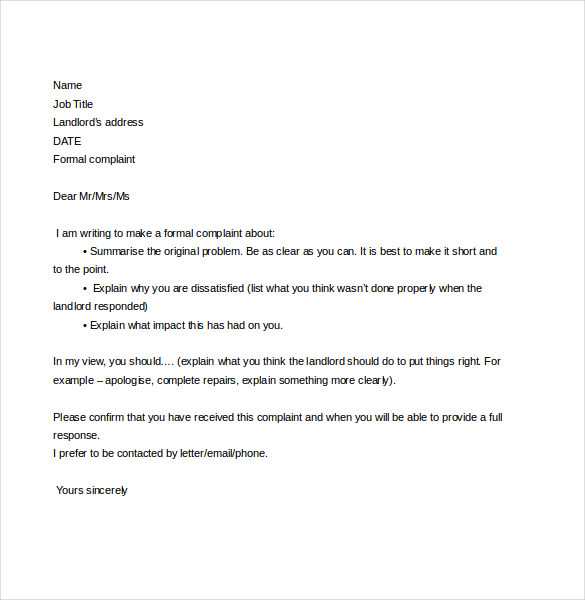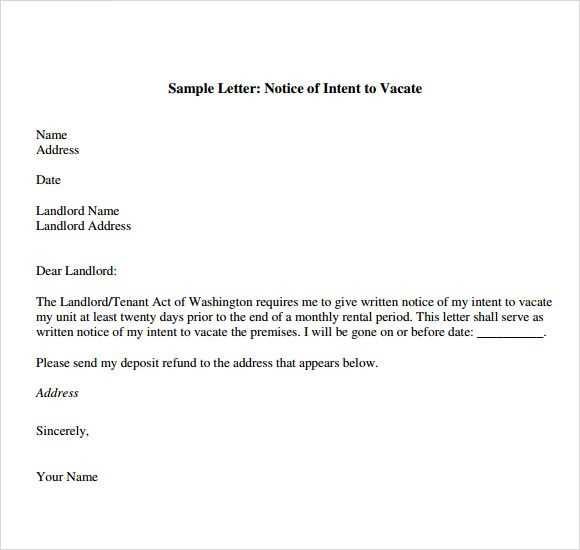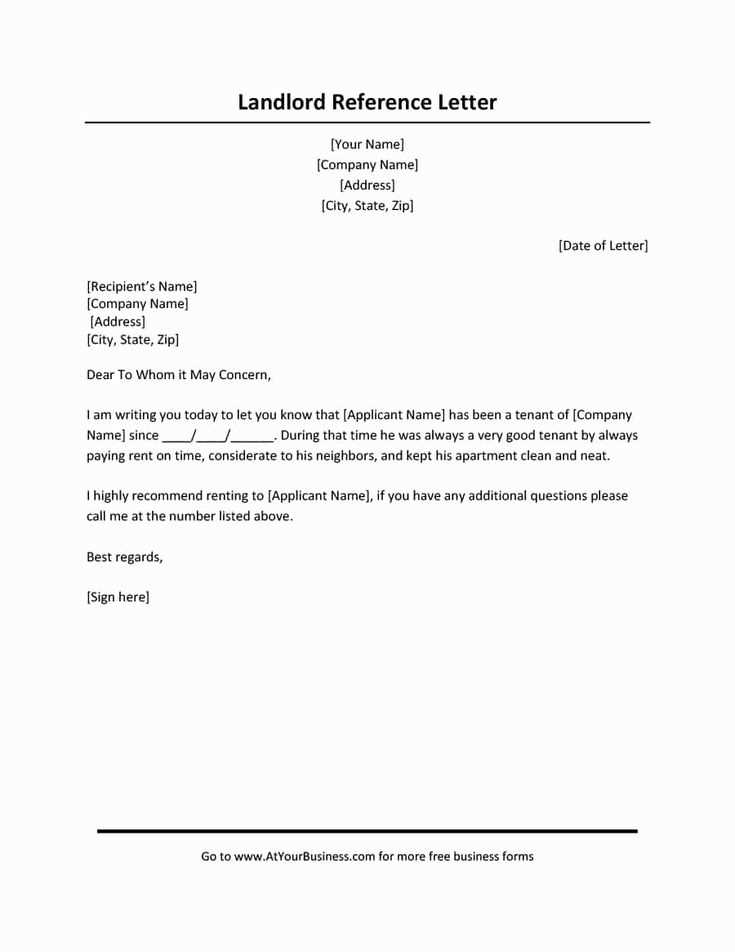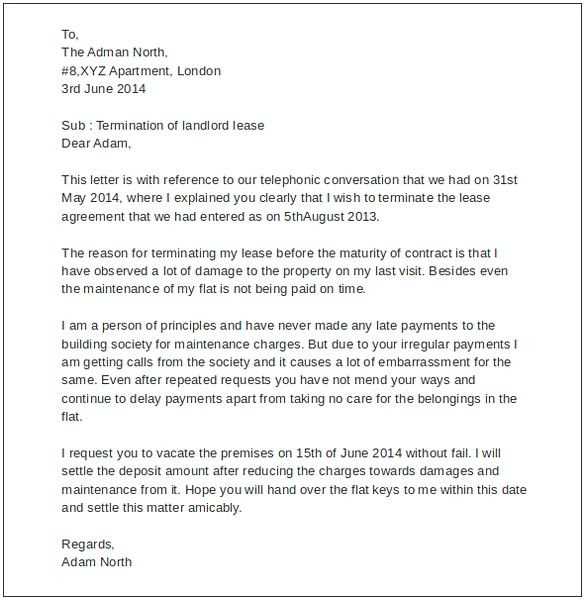Template Letter to Landlord for Different Situations

Clear and respectful communication is crucial in any rental arrangement. Whether you’re addressing maintenance needs, discussing lease terms, or notifying about a move, expressing yourself properly can help maintain a good relationship and resolve issues quickly. Having a well-structured approach can save time and prevent misunderstandings between tenants and property owners.
By following a few guidelines, you can ensure that your messages are professional and to the point. A properly worded request or notice can make a significant difference, whether you’re negotiating, making a complaint, or requesting repairs. It’s important to be concise yet thorough, leaving no room for ambiguity.
Effective Template Letters for Landlord Communication
When it comes to addressing important matters with your property owner, having a well-crafted message can help ensure clarity and prompt attention. Whether you’re reaching out about repairs, a lease update, or other concerns, the way you communicate plays a key role in achieving a positive outcome. A structured and professional approach to drafting your correspondence can help you address issues efficiently and maintain a respectful tone throughout.
In these situations, it’s essential to be clear about your request or concern while maintaining a polite and formal tone. Clear communication not only helps avoid misunderstandings but also fosters a positive relationship with the property owner. By organizing your thoughts and presenting them in a straightforward manner, you can increase the likelihood of a quick and favorable response.
Key Elements to Include in a Letter
When drafting correspondence to your property owner, certain details are essential to include in order to make your message clear and actionable. The more organized and precise your communication, the more likely it is that your concerns will be addressed in a timely manner. Below are the key elements that should be part of any communication with your property owner:
- Clear Subject Line or Heading: Make sure the purpose of your message is immediately evident.
- Your Contact Information: Always provide your full name, address, and contact details for easy follow-up.
- Specific Request or Concern: State the issue or request in clear terms, such as a maintenance issue, payment question, or lease inquiry.
- Relevant Dates: Include important dates such as when the issue started or when you expect a response.
- Polite and Professional Tone: Maintain a respectful tone throughout, even when discussing problems or making requests.
- Call to Action: Clearly explain what you are asking the property owner to do, such as scheduling a repair or confirming a lease change.
By including these key elements, your message will be both professional and effective, ensuring that your concerns or requests are addressed appropriately.
How to Request Repairs or Maintenance
When an issue arises that requires attention, it’s important to make your request for repairs or maintenance as clear and direct as possible. Whether it’s a malfunctioning appliance, plumbing issue, or any other necessary fix, your communication should outline the problem concisely, specify the urgency, and provide all relevant details to ensure a prompt response. A well-structured request can lead to a quicker resolution, preventing further inconvenience.
Here are some key points to consider when submitting a request for repairs or maintenance:
- Describe the Issue: Clearly explain the problem, including how long it’s been occurring and any specific symptoms or malfunctions.
- Specify the Location: Indicate exactly where the issue is happening, such as the specific room or area of the property.
- Indicate Urgency: If the problem affects your living conditions, make sure to mention the urgency, such as safety concerns or inconvenience.
- Request for Action: Politely ask for the necessary repairs or maintenance, including when it would be convenient for them to visit or fix the issue.
Being clear, polite, and detailed in your request will help ensure a timely and effective response from your property manager or maintenance team.
Notifying Your Landlord of Moving Out
When you decide to move out of a rented property, it’s essential to inform the property owner in advance. A well-worded notification allows both parties to prepare for the transition, whether it’s arranging for an inspection, discussing the return of the security deposit, or finalizing any remaining responsibilities. Proper communication ensures a smooth move-out process and can prevent potential misunderstandings.
Important Details to Include
Your notification should include specific details to help the property owner understand your intentions and schedule necessary actions. These may include your planned move-out date, any arrangements for property inspections, and a request for the return of your security deposit. Providing ample notice, usually 30 days, is often required by rental agreements and ensures both sides have enough time to prepare.
Maintaining a Professional Tone
Even if you’re moving out due to dissatisfaction or issues with the property, it’s important to maintain a polite and professional tone. This will help preserve a positive relationship for any future references or dealings. Ensure your message is clear, concise, and free of unnecessary details that could complicate the process.
Formal Notice for Rent Payment Issues

In situations where there are payment delays or issues with rent, it’s important to formally notify your property owner as soon as possible. Clear and respectful communication helps resolve the matter efficiently and maintains a professional relationship. A formal notice outlining the issue and proposed solution will clarify your position and prevent misunderstandings.
Details to Include in the Notice
When addressing rent payment concerns, ensure your notice includes essential details such as the payment amount due, the date the payment was originally due, and any reasons for the delay if applicable. Be transparent about the situation and suggest a reasonable solution, such as a revised payment date or a plan to cover the overdue amount. If applicable, also reference any prior agreements or extensions you have discussed.
Polite and Professional Language

While addressing payment issues, it’s crucial to use a polite and professional tone. A respectful approach can help in negotiating a resolution without escalating the situation. Clearly state the steps you intend to take or the assistance you need from the property owner to resolve the issue quickly.
Template for Rent Negotiation Request
When you believe that a rent adjustment is necessary, presenting a well-thought-out request can help in reaching a mutually beneficial agreement. Whether it’s due to changes in the market, personal financial circumstances, or other factors, making a formal request for a rent review requires clarity and professionalism. The goal is to explain your reasoning, suggest an alternative amount, and open the door for discussion.
In such cases, it’s important to highlight your reasons for requesting the adjustment. Be sure to reference any supporting data, such as comparable property rates in the area or changes in your personal situation, which may justify the proposed change. Providing evidence or context will make your request more compelling and demonstrate that you are approaching the matter thoughtfully.
Always ensure that your request is polite and reasonable, recognizing that the property owner has their own interests to consider. Presenting a clear, fair proposal can foster an open dialogue and help you come to an agreement that works for both parties.
Addressing Complaints or Concerns Professionally
When issues arise within a rental property, it’s crucial to approach them with professionalism and clarity. Whether the concern involves maintenance, noise disturbances, or other living conditions, addressing the problem in a respectful and structured manner can help in finding a swift resolution. A well-crafted communication can prevent escalation and maintain a positive relationship between tenant and property owner.
Key Strategies for Professional Communication

To ensure your complaint is taken seriously, it’s important to communicate the issue clearly and politely. Outline the problem, providing relevant details such as the exact location, the nature of the issue, and any attempts you’ve made to resolve it. Maintaining a calm and neutral tone is essential, even when the situation may be frustrating. A professional approach shows that you are seeking a solution, not creating conflict.
Details to Include in Your Message
Including the right information is key to effectively addressing your concerns. Make sure to mention:
| Information | Details to Include |
|---|---|
| Issue Description | Clearly describe the concern and its impact on your living conditions. |
| Location | Specify where the problem is occurring in the property. |
| Attempts to Resolve | Mention any steps you’ve already taken to address the issue, if applicable. |
| Proposed Solution | Suggest a reasonable course of action to fix the problem. |
By following these guidelines, you can effectively communicate your concerns and facilitate a prompt resolution while maintaining a respectful relationship with your property manager or owner.